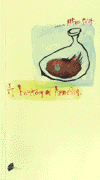"Fasting in Ramadan"
God, what am Iby Alfian Sa'at
But a pale copy
Of the true ascetics?
A lesson in humility.
Only under such heat, such thirst,
Does the soul realise,
The body is just a mirage.
Forgive me, God, for
Crossing the dates on the calendar,
Numbering thirty days of abstinence;
For observing how much
Temptation surrounds me.
The tap's mouth glistens, even though
It is only my eye that has polished it.
And it is only my longing
That saturates the colour of apples,
That turns a passing scent into form,
Like breaths sculpted in cold weather.
Feasting before dawn,
Each sunrise I fade,
Reduced to a mouth, source
Of desire, of original sin.
And at each sundown, a glassful of water
Travels down my gullet
And turns me solid again.
God, when you breathed life
Into the first man, was that
What answered his craving?
Or did he know then, that
As you fed him, you also gave him
Hunger, a crumb of that world
That you will cast him down into?
__________________________________________________________________
 This poem is reproduced with Alfian's permission. I met him a few days ago at the Ubud Readers and Writers festival, and among the books on sale, I found his A History of Amnesia (2001, Ethos Books).
This poem is reproduced with Alfian's permission. I met him a few days ago at the Ubud Readers and Writers festival, and among the books on sale, I found his A History of Amnesia (2001, Ethos Books).Somehow the book fell open at this page, which I think means the poem wants to be blogged about. There's timeliness too, a poem about fasting during this month of Ramadan. The poem is in itself a prayer, and a very moving and human one.
What is fasting all about? I think Alfian explains it so clearly "a lesson in humility" a reminder that the physical body is "just a mirage".
Fasting is (necessarily) tough, a real test of both mental and physical strength. The speaker recognises his own weakness. He crosses dates of the calendar, admits his temptation ... and begins to notice just how much of it surrounds him.
The first year I tried fasting, I was amazed at how heightened the senses become when one is deprived of sustenance. Colours are brighter, smells are so much sharper, and so it seems, is the recollection of taste. (There is also a "getting high" effect, which surprised me.) I remember standing in the supermarket, watching a Chinese couple eat guava. It was a fruit I'd never much liked before, but as they ate, I could almost feel and taste the sweet juicy crunchiness in my own mouth, and desired it so very much. (Since then, I've loved guava!)
Something similar happens when the speaker notices the more deeply saturated colour of the apples, and the scent of them that conjures up their form.
There are images I love in the poem - the scent of apples being like "breaths sculpted in cold weather", the eye polishing the mouth of the tap, a glassful of water turning the speaker solid again at dusk.
I love too the ending of the poem. the idea that God gave men hunger as "a crumb of that world / That you will cast him down into." A small taste of suffering that so many have to endure as a fact of their daily existence.
Labels: bibliobibuli's choices, poems about religion, Singaporean poetry

3 Comments:
lovely...
this is my first year of fasting after my health hoohaa. all i could think of the last few days was food... nevertheless great stuff.
I am rather surprised because I wasn't expecting this poem from Alfian Sa'at, having encountered a few of his other poems some years back. Definitely, this is further prove of his enormous and much I really varied talents.
This poem conveys the emotional and psychological experience of fasting in a deeply personal and spiritual space between the self and the divine. At once, humbly honest in the acknoledgement of struggle, there is also a questioning of human fragility that makes this poem transcend itself.
The wonderful experiantial quality of Sa'at's language brings together both the physical (sensory) and spiritual desires, especially the description of the tap glistening through one's eyes and the 'colouring' of the apple, which also alludes to the scene of the first temptation and original sin.
i missed that way of reading the apple reference ... but it fits so nicely
yes "humble acknowledgement of struggle" says it so well
the whole book has me enthralled - especially as his work is so approachable and unpretentious and focuses on local concerns
Post a Comment
<< Home